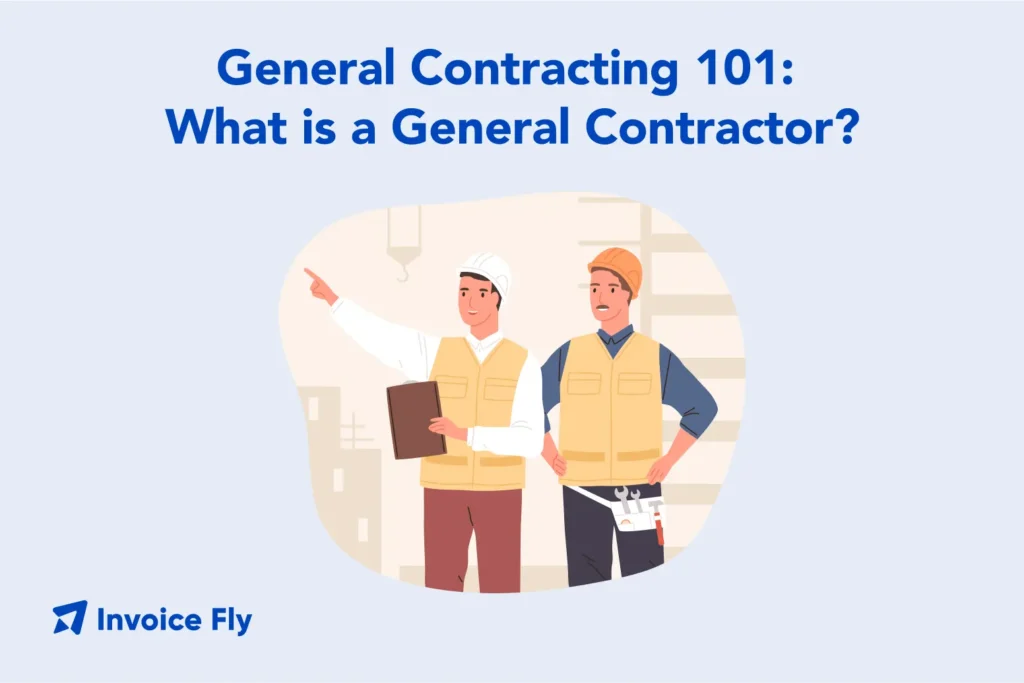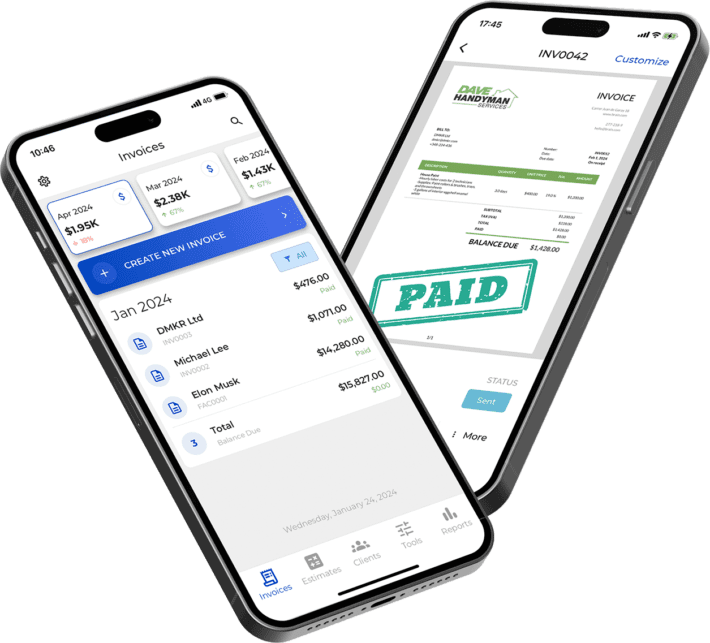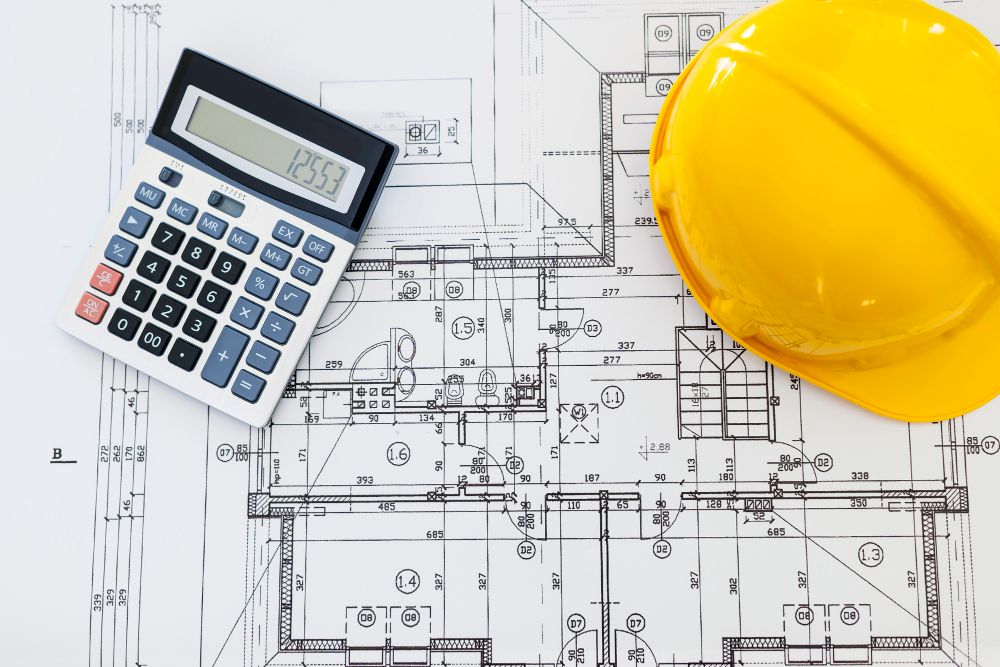General Contracting 101: What is a General Contractor?

Table of Contents
General contracting is the process of managing and overseeing construction projects from start to finish. A general contractor coordinates everything from hiring subcontractors and securing permits to managing budgets and deadlines.
In this guide, you’ll learn what general contracting means, what contractors do, the skills and licenses required, and how to start your own contracting business in 2025.
Need tools to run your contracting business better? Try Invoice Fly’s Business Reports to track performance and make smarter decisions!

What Is a General Contractor?
A general contractor (often called a GC) is a professional or company that coordinates and supervises all aspects of a construction project. They serve as the main point of contact between property owners and everyone involved—subcontractors, suppliers, and tradespeople.
General contractors may work independently or lead large construction companies. While they may employ laborers and project managers, most hire subcontractors for specialized work. In short, they act as the project manager connecting owners, architects, and engineers.
According to the U.S. Bureau of Labor Statistics, construction managers (including general contractors) earned a median annual wage of $106,980 in 2024, with job growth projected at 9% through 2034—much faster than average.
Get Started with Invoice Fly’s Software
Invoice Fly is a smart, fast, and easy-to-use invoicing software designed for freelancers, contractors, and small business owners. Create and send invoices, track payments, and manage your business — all in one place.

Whether remodeling a kitchen or building a skyscraper, general contractors share one mission: deliver the project safely, on time, and within budget.
General Contractors on Construction Projects
On a job site, the GC wears many hats—planner, problem-solver, and safety enforcer. Most work under a lump-sum contract, where they bid a total project price after analyzing drawings, collecting subcontractor quotes, and adding overhead. Once accepted, they’re responsible for completing the project as agreed.

What Does a General Contractor Do?
General contractors oversee every phase of construction, ensuring all pieces come together properly. Their work begins before breaking ground and continues well after the last nail is hammered.
Key Roles and Responsibilities
A general contractor’s responsibilities span the entire project lifecycle:
Pre-Construction:
- Develop construction budgets and cost estimates
- Bid on projects through requests for proposals
- Hire and contract with qualified subcontractors
- Collaborate with architects to ensure designs are buildable
- Create project schedules and timelines
- Secure necessary permits and approvals
During Construction:
- Coordinate daily site activities and workforce planning
- Monitor work quality and ensure code compliance
- Manage project schedules and adjust for delays
- Order materials and ensure timely delivery
- Conduct safety inspections and enforce OSHA regulations
- Handle change orders and scope modifications
Post-Construction:
- Ensure all subcontractors and vendors are paid
- Collect and track lien waivers
- Complete final inspections
- Address punch list items
- Hand over completed project to owner
Working with Subcontractors and Suppliers
Subcontractors handle specialized trades—electricians, plumbers, roofers, HVAC techs, and more. GCs vet these professionals, negotiate fair contracts, and schedule their work to avoid overlap.
They also manage supplier relationships—sourcing materials, verifying deliveries, and ensuring quality control. A GC’s success depends on communication and reliability across every partner involved.

Managing Budgets, Permits, and Schedules
Three of a GC’s toughest jobs are budgeting, permitting, and scheduling.
- Budget Management: GCs track all expenses—from materials to equipment. Tools like Construction Quotation Templates and Expense Reports help them stay accurate.
- Permits & Approvals: Every project requires permits and inspections. GCs handle applications, coordinate inspections, and ensure compliance.
- Scheduling: Construction projects involve many moving parts. GCs use scheduling software to coordinate subcontractors, minimize downtime, and keep clients updated.
Efficient scheduling directly affects profitability, according to U.S. Census Bureau data.
How General Contracting Works
Understanding the general contracting process helps property owners know what to expect when hiring a GC.
From Project Planning to Completion
- Bidding & Contract Award: Owners solicit bids. GCs estimate costs, gather quotes, and submit proposals.
- Pre-Construction: Once selected, the GC finalizes agreements, orders materials, and obtains permits.
- Construction: Subcontractors perform work in sequence—sitework, framing, utilities, finishes.
- Closeout: The GC completes punch lists, schedules final inspections, and hands the project over.
Communication and Documentation
Documentation is critical—contracts, permits, inspection reports, progress photos, and Work Order Templates keep everything organized.
Modern GCs use project management software and cloud tools to streamline communication, share updates, and reduce errors.
General Contracting Requirements
Becoming a licensed general contractor requires meeting specific educational, experience, and legal requirements.
Contractor Licensing and Certification
Becoming a GC requires meeting specific licensing, insurance, and safety standards.
Contractor Licensing and Certification
Most states require contractors to:
- Have 2–5 years of construction experience
- Pass licensing exams covering building codes, safety, and business law
- Provide proof of insurance and financial stability
Learn how to get your general contractor license and meet your state’s requirements.
Insurance and Legal Obligations
Licensed GCs must carry:
- General Liability Insurance — covers property damage/injuries
- Workers’ Compensation — covers employee injuries
- Builder’s Risk Insurance — covers projects under construction
Proper coverage protects both your business and clients. Learn how to get construction insurance before starting work.
Building Safety and Compliance Standards
GCs are legally responsible for ensuring projects meet OSHA standards, building codes, and zoning laws. Violations can result in costly fines and delays, so safety and compliance training are vital.
Starting a General Contracting Business
Many experienced construction professionals eventually start their own general contracting companies.
How To Get Licensed as a General Contractor
The path to licensure typically follows these steps:
- Gain required experience working in construction for several years
- Complete pre-license education required in your state
- Apply for license with proof of experience and education
- Pass licensing exam
- Obtain insurance and bonds
- Register your business
Learn more in How to Get an Independent Contractor License.
Setting Up Your Business and Finding Clients
Beyond licensing, starting a successful general contracting business requires business planning, financial systems using proper bookkeeping for contractors, marketing and sales efforts, and accurate estimating skills using free Estimate Templates.
Build a professional website, create portfolios showcasing past work, network with architects and developers, and join industry associations like the Associated General Contractors of America.
Tools and Software That Simplify Work
Technology saves GCs time and stress. Use:
- Invoice makers for billing
- Estimate templates for quoting jobs
- Time tracking software for team management
- Construction management apps for project coordination
Digital tools reduce paperwork, prevent billing mistakes, and improve cash flow visibility.
Commercial vs. Residential Contracting
GCs typically specialize in residential or commercial projects.
- Residential GCs: Focus on homes, remodels, and additions.
- Commercial GCs: Handle offices, restaurants, and industrial facilities.
Profit Margins and Client Expectations
- Residential Margins: 10–20% (up to 25% for remodels)
- Commercial Margins: 5–15% depending on scale
Residential clients tend to be more emotionally involved; commercial clients prioritize timelines and ROI.

Final Thoughts
General contracting is where planning meets execution. It takes technical knowledge, people skills, and business sense to transform designs into finished buildings. Whether you’re considering hiring a general contractor or becoming one yourself, understanding the process helps you make smarter decisions.
For aspiring contractors, the path is clear: get licensed, build real-world experience, and invest in relationships with reliable subcontractors. The construction industry continues growing, and there’s strong demand for professionals who can deliver quality work on time and on budget.Need tools to run your contracting business better? Try Invoice Fly’s Business Reports to track performance and make smarter decisions!
Get Started with Invoice Fly’s Software
Invoice Fly is a smart, fast, and easy-to-use invoicing software designed for freelancers, contractors, and small business owners. Create and send invoices, track payments, and manage your business — all in one place.

FAQs About General Contractors
They coordinate all construction activities—budgeting, hiring, scheduling, permitting, and safety management—from start to finish.
Through project bids that include a markup (typically 10–20% residential, 5–15% commercial). Profit equals the difference between costs and contract value.
According to the BLS, construction managers earn a median of $106,980 annually. Experienced GCs or company owners can earn $200,000+ per year.
Most receive progress payments or milestone payments throughout the project, with final payment after completion.
Subcontractors, suppliers, and project managers all work under the GC’s direction to complete specific project tasks.
The GC manages the full project and contracts with the owner; subcontractors handle specialized tasks under the GC’s supervision.
